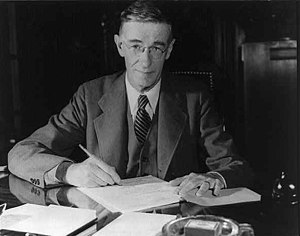
|


On November 17, 1944, just as the second World War was heading towards its end, the then President of the United States of America composed a letter addressed to Dr. Vannevar Bush, who was the Director of The Office of Scientific Research and Development. By writing this letter, he aimed to bring "improvement [in] the national health, the creation of new enterprises bringing new jobs, and the betterment of the national standard of living” through the means of science, research, and technology.

Let us take a step back, the first time man achieved flight (excluding flight via hot air balloons) was in December 17, 1903 thanks to the brilliance and diligence of the Wright Brothers. Achieving flight had always been a desire humans possessed ever since we became sentient enough to identify the possibility. It took mankind hundreds if not thousands of years to achieve flight. According to NASA's records, the first real recorded studies of flight were made by Leonardo Da Vinci in the 1480s. So it's safe to say we've come a long way in achieving this goal, it is something we have waited long to attain. In this context, if you were to ask the Wright brothers when they thought man would step on the moon, what do you think their answer would be? Even with the amount of experience they possessed making the first airplane, I speculate their answer would probably tend towards being at least higher than a couple hundred years. However, we were able to step on the moon a mere 66 years after man achieved flight for the first time. This fact serves as a testament to man's ability.

But how did we achieve such an extrordinary feat in such relatively less time? Answer: we had two World Wars to catalycize this event. Airplanes were massively important tools for all parties during the First World War and even more so during the second. The need for more production meant the need to find better and more efficient modes to produce them while at the same time improving what these machines were capable of doing. FDR was amazed at the speed of innovation and the drive of scientists and engineers during the war, which is why he wanted to funnel that energy towards increasing the standard of living during the times of peace, evident from the following piece of paragraph from his letter.
"New frontiers of the mind are before us, and if they are pioneered with the same vision, boldness, and drive with which we have waged this war we can create a fuller and more fruitful employment and a fuller and more fruitful life."
What I personally am amazed by is the sincerity reflected by his writings. The sincerity of an honest man loyal to his countrymen, dedicated to the betterment of his fellow citizens' lives, a trait that seems fictional in today's world.
In his letter, he also asks Dr. Bush:
"Can an effective program be proposed for discovering and developing scientific talent in American youth so that the continuing future of scientific research in this country may be assured on a level comparable to what has been done during the war?"
The reply Dr. Bush gave in return, I believe, has had a significant role in making America the technological superpower it is right now. The full transcript of this correspondence can be found here. I would like to continue writing on this in the future.
